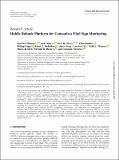Mobile Robotic Platform for Contactless Vital Sign Monitoring
Author(s)
Huang, Hen-Wei; Chen, Jack; Chai, Peter R.; Ehmke, Claas; Rupp, Philipp; Dadabhoy, Farah Z.; Feng, Annie; Li, Canchen; Thomas, Akhil J.; da Silva, Marco; Boyer, Edward W.; Traverso, Giovanni; ... Show more Show less
DownloadPublished version (1.173Mb)
Publisher with Creative Commons License
Publisher with Creative Commons License
Creative Commons Attribution
Terms of use
Metadata
Show full item recordAbstract
The COVID-19 pandemic has accelerated methods to facilitate contactless evaluation of patients in hospital settings. By minimizing in-person contact with individuals who may have COVID-19, healthcare workers can prevent disease transmission and conserve personal protective equipment. Obtaining vital signs is a ubiquitous task that is commonly done in person by healthcare workers. To eliminate the need for in-person contact for vital sign measurement in the hospital setting, we developed Dr. Spot, a mobile quadruped robotic system. The system includes IR and RGB cameras for vital sign monitoring and a tablet computer for face-to-face medical interviewing. Dr. Spot is teleoperated by trained clinical staff to simultaneously measure the skin temperature, respiratory rate, and heart rate while maintaining social distancing from patients and without removing their mask. To enable accurate, contactless measurements on a mobile system without a static black body as reference, we propose novel methods for skin temperature compensation and respiratory rate measurement at various distances between the subject and the cameras, up to 5 m. Without compensation, the skin temperature MAE is 1.3°C. Using the proposed compensation method, the skin temperature MAE is reduced to 0.3°C. The respiratory rate method can provide continuous monitoring with a MAE of 1.6 BPM in 30 s or rapid screening with a MAE of 2.1 BPM in 10 s. For the heart rate estimation, our system is able to achieve a MAE less than 8 BPM in 10 s measured in arbitrary indoor light conditions at any distance below 2 m.
Date issued
2022-01Department
Massachusetts Institute of Technology. Department of Mechanical Engineering; Koch Institute for Integrative Cancer Research at MITJournal
Cyborg and Bionic Systems
Publisher
American Association for the Advancement of Science
Citation
Hen-Wei Huang, Jack Chen, Peter R. Chai, Claas Ehmke, Philipp Rupp, Farah Z. Dadabhoy, Annie Feng, Canchen Li, Akhil J. Thomas, Marco da Silva, et al. Mobile Robotic Platform for Contactless Vital Sign Monitoring. Cyborg Bionic Syst. 2022.
Version: Final published version
ISSN
2692-7632